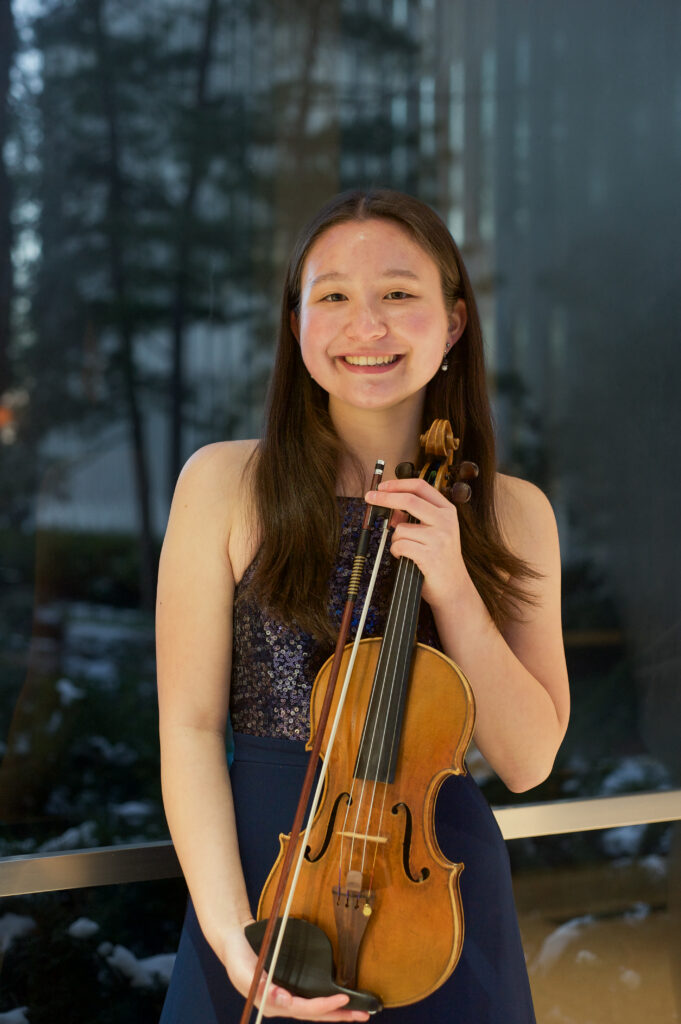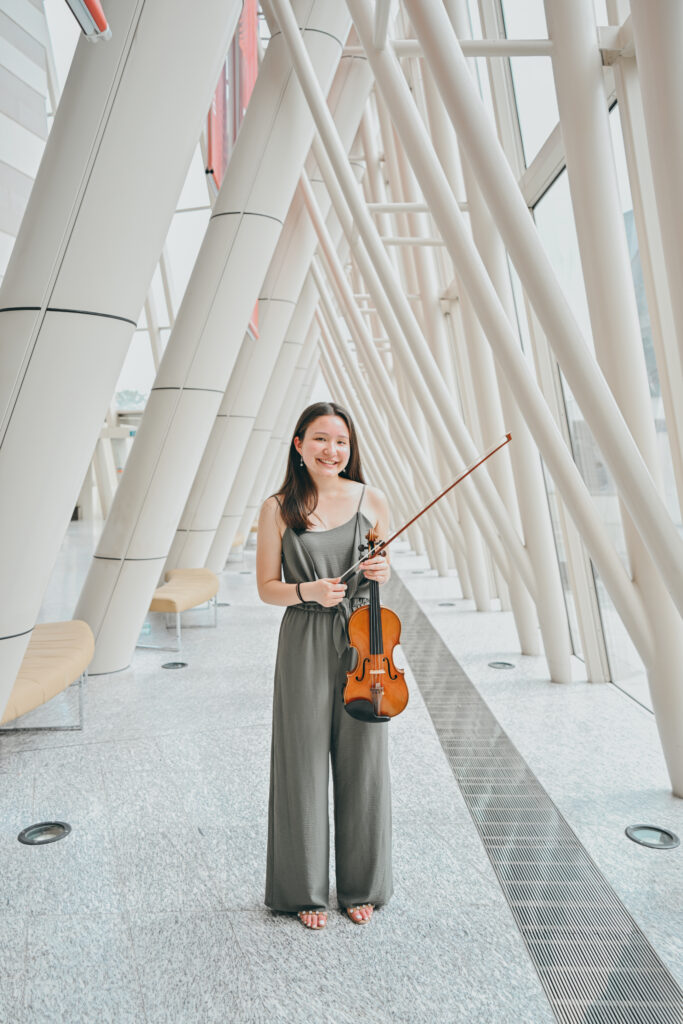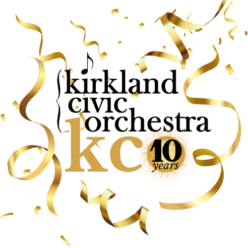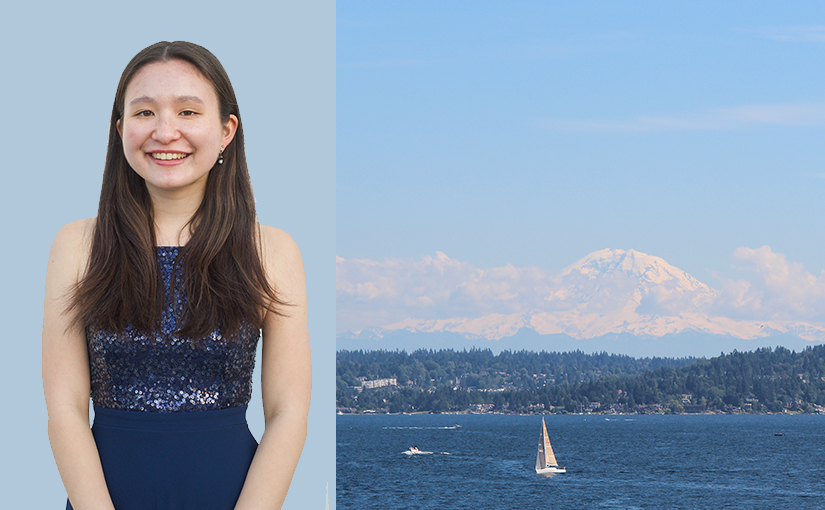- When did you start playing the violin?
- Do you play anything else?
- What studio were you in?
- When did you think to pursue music as a profession or go to music school?
- Did you have an experience that made you feel special or showed you that your playing was unusual?
- How did you become the guest soloist?
- What do you like about the Florence Price concerto?
- What are you looking forward to doing this summer?
KCO: Hi I see you are in a practice cube somewhere. Where are you? Eleanor: I am in a practice room at Oberlin where I go to school. KCO: What year are you in at Oberlin? Eleanor: I’m just finishing up my second year. KCO: Great. Let’s get started.
KCO: When did you start playing the violin?
Eleanor: I started playing the violin. That was my very first instrument. I started playing when I was about four years old, when I was really little. I come from a very musical family. So, it was just almost a given that I would pick up an instrument.
My grandparents on my dad’s side were both piano teachers, and all of my dad’s brothers are professional musicians now. My sister, who is six years older than me, was playing the violin. That was my “in” to the world, and I’ve just been at it since I was four.
KCO: That’s primarily from your dad’s side of the family?
Eleanor: Primarily, from my dad’s side, but my mom has been a very incredible support and a practice buddy. She drove me to all my lessons and such, so it comes from both sides.
KCO: Do you play anything else?
Eleanor: Not currently, I played the flute for four years. Three years in middle school, and started in fifth grade, just to mix it up a little bit. I was in band in school for those years as well. My uncle is a pianist, but he also plays flute. I was able to use one of his flutes and have some fun with something else for a couple of years.
KCO: Did somebody make you play in band? What was the appeal of playing in the band?
Eleanor: I grew up in Bellevue, so the school district has all the 5th graders learn new instruments.
Instead of just going in with the violin, which I already knew how to play, I decided I wanted to play something different. I chose the flute, and then I stuck with it through middle school. And then, in high school, I decided I had enough. And I committed to play the violin.
KCO: What studio were you in?
Eleanor: I started violin when I was back from North Carolina, but once I moved to Seattle, I was about six. I studied with Lucy Shaw. She’s a violin teacher in the area. I studied from about second first grade through Middle School. She was great. I went through all the Suzuki books with her.
After that, when I was going to high school, I transitioned to the Coleman studio. I studied with Jan Coleman for a couple of months just to refine someof my technique, some left hand issues I had. Then I started to study with Simon James for the rest of my high school time. He helped me through the audition process for college, too.
KCO: When did you think to pursue music as a profession or to go to music school?
Eleanor: I was trying to think about this question. I could never really pinpoint a specific moment, but I think from about Middle School onward that it was just a gradual feeling that I just didn’t see myself in college, without continuing to play the violin. And so, it just seems like a logical choice to go into music and study it in college as well, which is what I ended up doing.
KCO: Did you have an experience that made you feel special or showed you that your playing was unusual?
Eleanor: I think one of the things that I really enjoyed, and it guided me towards the path of music was playing in youth orchestra, not even a specific moment. There were a couple times I remember vividly putting something together and I was just a section violin in the orchestra. It’s the thrill of hearing all of the voices and instruments play together. Something that I never heard live or had the opportunity to play. Hearing that for the first time it was really exhilarating and just made me want more of that.

I’ve also had some cool summer experiences. I think I was going into 9th grade, so it was summer after middle school. I went to the Indiana University Summer String Academy at the Jacobs School of Music. That was really the first time where I was just surrounded by people who also wanted to play the violin, the cello, or the viola in the same way, and I didn’t have to worry about school. All I could do was just practice. We had chamber music and we had orchestra, and it was just a fun and supportive environment to play the violin. I think that was really formative and good for me.
Now I get to do it full time as a student as I did in the summer, which is really nice.
KCO: Do you remember what the piece that inspired you in youth orchestra?
Eleanor: One that I remember vividly was when I was playing with Seatle Youth Symphony Orchestra. We were playing was John Adams’s The Chairman Dances.
It’s pretty tricky to put together but it was fun the first rehearsal. It opens and it’s very rhythmic. But it’s very soft and atmospheric. Hearing that for the first time, and I was in the middle of the second violin section, so I was quite literally in the middle of the orchestra. To hear everything around me was really cool. That was actually one of maybe my favorite concerts I’ve ever played. The program was The Chairman Dances by John Adams, Symphonic Dances from West Side Story by Leonard Bernstein, and Danzon No. 2 by Arturo Marquez. It was altogether a really fun performance and rehearsal cycle.
KCO: How did you become the guest soloist?
Eleanor: The biggest connection I have to the Kirkland Civic Orchestra is that my dad plays in the orchestra and has been for almost as long as we’ve been in the Seattle area. That’s about 10 years or so now I believe.
I remember going to these concerts in middle school and probably even earlier. There’s one in September and it goes through May. I also remember the Ballard Locks concerts. They were always super fun outside. I grew up going to these concerts. And then, as I got older and into college, my dad would encourage me to come to the rehearsals whenever I was in town because it would just be good practice to play with an orchestra and have the opportunity to play new repertoire.
I think last year you guys were doing an all Sibelius program and my dad really wanted me to come. It’s tricky and he wanted me to have the experience of playing that. So gradually I started to have more experiences with the orchestra.
Then at the end of last year, I believe the conductor announced the programming for the next year. And he mentioned that for the last concert of the year you will be playing the Florence Price Violin Concerto No 2, and there was no soloist yet. I think quite literally that night, my dad called me or texted me to say, “you have to find this piece of music and you have to start learning it now.” For a young musician, having the opportunity to play with an orchestra just doesn’t come about that often. It wasn’t a given that I would be able to play with the orchestra. But my dad thought, and I thought that if I could learn it, and play it for Jim, I might have a slim chance of being able to play with you all.
I learned the concerto throughout the summer and then last August, I reached out Jim Truher, the conductor, and asked if I could maybe play some of the Price for him to see if it might be possible for me to play with the orchestra.
And it worked out. So here I am, and it’s been fun to keep working on it.
KCO: That’s awesome. That’s a good story. You were just a young person playing in the section at some point?
Eleanor: Yes. I never played a concert, but I had been at rehearsals maybe five or six times, I think.
KCO: Your dad’s experience both as a violinist, but also with the Kirkland Civic Orchestra, is a great learning experience that might not seem like learning.
Eleanor: Yes. He doesn’t do violin as a career. But he always practices his music and he’s always very supportive, and it’s just fun to go play with him at rehearsals. We normally try to be stand partners, so that’s always great fun.
KCO: What do you like about this concerto?

Eleanor: I think this might be one of the few pieces I’ve played that not many people other than me have played. I know obviously people have but it’s not quite in the string cannon the way that some other pieces and concertos are. It was certainly new for me; it was new for my teachers. In a sense, we were both learning together this year. Because it’s not played very often that my even my college library didn’t even have the music and Oberlin has a very, very good Library. I’m actually in the process of getting them to buy the music.
It’s been fun to discover the music. I think when you’re playing a piece that’s just not performed that often, there’s sort of a different sense of responsibility that’s placed on your shoulders as the soloist. With some other pieces, you can rely on the fact that the audience really knows the piece. With this one, I really feel like I have to do a good job of introducing it to the audience, beyond just doing a good job playing it. And drawing them in with my playing. That’s something I’ve talked a lot about with my teacher, and it has been fun to explore.
It’s just a charming piece. When I tell people about it, I tell them that there’s really a bit of everything in violin playing that you can show off. It has some beautiful lyrical sections. It has dance-like sections. It has some fiery, virtuosic passages that are tricky, that are also fun to play. It’s short and compact. It’s almost more like a fantasy for violin and not a concerto, so it’s just a lot of fun to play and has been to fun to learn it this year.
KCO: You did a great job of fleshing that out for us here. Now, I will listen to piece with what you’re saying in mind. I think it will be great for our audience to hear. Now that you have the Price under your fingers, are you able to use it for a jury? Does it end up being useful at school?
Eleanor: It has been. Because I travelled back to Seattle to rehearse with the orchestra, I had to take my jury early. Juries were scheduled on days when I’d be home rehearsing with you guys, so that wasn’t going to happen. I took my jury early in April, and I played the Price because it just seemed like a natural and obvious choice to play for my jury. I’d been working on it for a while.
KCO: What are you looking forward to this summer when you get back home?
Eleanor: The semester wraps up in one week. So, I have that to look forward to. But before I come home, I have two more performances, so I’m excited for those. I’m playing in the contemporary music ensemble, so I have a concert with that ensemble.
One of the things I enjoyed working on at Oberlin is they have a fabulous early music program. I started taking secondary Baroque violin lessons, which have been fun. We have a studio recital coming up, which will be my first time ever playing a Baroque violin for an audience. That is exciting.
But beyond that, I have a couple of music festivals this summer lined up that I am going to. It’s always nice because I don’t have to worry about schoolwork when I’m there. I just get to do some good practicing and dive into some new repertoire that I need to learn.
I’m going to be spending quite a bit of time at home this summer, which doesn’t always happen. I really love Seattle. And there’s so much stuff to do in the summer. I’m excited to be able to explore that. There’s so much nature around and hiking and camping to do.
There’s always good shows and concerts and things to go to in the city in the summer as well. The Seattle Chamber Music Society is a big one that I should be able to go to and I’m excited to go hear. Then before I know it, I’ll be back here, starting my third year.
KCO: Well, it’s been great chatting with you. Thank you so much for taking the time.

